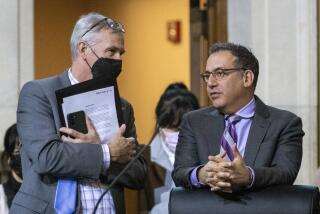Budget ax to spare LAPD
Despite deepening worries about the region’s economy and a growing municipal budget deficit, Los Angeles city leaders Tuesday refused to back away from a Police Department buildup even if it means sacrificing other basic services.
The City Council decided against reducing the size of next month’s Los Angeles Police Department Academy class, an action that would have saved nearly $700,000 this budget year and more than $3 million in the year that begins July 1.
The additional officers will contribute to an aggressive expansion of the LAPD, pushing beyond Mayor Antonio Villaraigosa’s goal of 226 new officers this year. But it also will add to the cost of a department that already takes one-quarter of the city’s $4.4-billion general fund budget.
“The message we are sending today [is that] we are going to continue hiring officers,” Councilwoman Wendy Greuel said during a budget hearing. She later issued a letter with two other council members calling any slowdown of the police expansion “an absolute last resort.”
Speaking to a gathering of economists Tuesday, Villaraigosa repeated his threat to veto any attempt at slowing the LAPD’S growth. “As the economy weakens, the last thing we should do is put the brakes on police hiring,” he said.
Villaraigosa and the council were holding firm on the police issue even as the city’s financial and policy analysts warned of the economic consequences.
Chief Legislative Analyst Gerry Miller told the council that the cost of more police, along with fire and sanitation services, would require cuts of up to 14% in all other departments in the coming budget year. The reductions would come on top of cuts of as much as 10% this fiscal year.
In a report to the council Monday, Miller had warned that Villaraigosa’s proposed budget cuts -- including voluntary five-day furloughs for most city workers and selling off city-owned cars -- would not save nearly as much money as the mayor had anticipated.
In its latest budget hearing, the council Tuesday slashed $2 million from the city library system. Officials also trimmed $477,000 for new neighborhood councils to pay for graffiti removal, and $600,000 was taken from a fund for sidewalks and street services to pay for left-hand turn signals. The mayor also will have a say in the cuts the council makes.
Even after those maneuvers, city leaders must still trim $40 million from this year’s budget as a step toward closing a total $155-million shortfall.
Chief Administrative Officer Karen Sisson also painted a bleak picture of city finances Tuesday.
Sisson told the council that city expenses are expected again to grow faster than revenue next fiscal year and that the widening gap will contribute to a budget deficit now projected at nearly $400 million.
In the past, city officials relied on strong revenue growth or unanticipated money from real estate transactions to fill the gap. Those sources have disappeared as the housing market has cooled, leaving an alarmingly thin reserve fund.
“It’s important to begin discussing controversial items that must be on the table,” she said. “Police hiring will have to be looked at as trade-offs with other city services. It’s the beginning of a very challenging fiscal period for the city.”
Council members floated several ideas to raise revenue, including Councilman Dennis Zine’s suggestion to get rid of the five-member Board of Public Works, the only city commissioners who earn salaries.
Councilman Bill Rosendahl called for a fivefold increase in the amount of money the city collects from parking meters, from $21.6 million to $100 million. Councilwoman Janice Hahn recommended a new fee on each barrel of oil extracted from beneath the city.
As city officials wrestled over the budget, economists at a gathering of business and labor leaders predicted that the L.A. economy would continue to sputter but without falling into recession.
“The economy is somewhat unsteady,” Bruce Baltin, senior vice president of PKF Consulting, told the gathering at Staples Center. “Things are a little rocky, but we don’t see ourselves going into a serious downturn, except in housing.”
More to Read
Sign up for Essential California
The most important California stories and recommendations in your inbox every morning.
You may occasionally receive promotional content from the Los Angeles Times.










